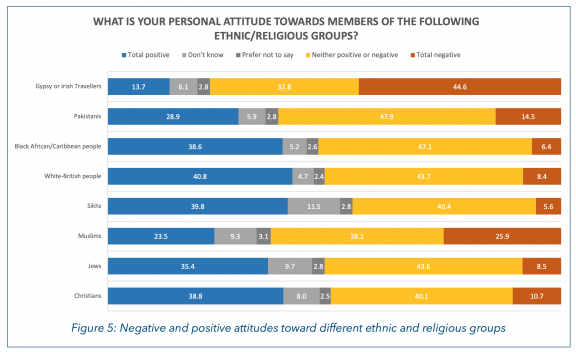A far ranging survey of attitudes to Muslims and Islam also revealed the extent of prejudice towards Gypsies and Irish Travellers.
This report is based on a survey conducted by YouGov using an online interview with members of YouGov’s participant panel. In total, 1667 people completed the survey and prior to analysis, the sample was weighted by age, political measures, gender, social grade, region and level of education to ensure representativeness.
Gypsy and Irish Travellers are viewed more negatively by the British public, with 44.6% of people viewing this group negatively. Muslims are the UK’s second ‘least liked’ group, 25.9% of the British public feel negative towards Muslims.

Higher social classes exhibit more negative attitudes
Younger people, women, non-believers, Labour voters and Remainers tended to have less negative attitudes to ethnic and religious groups than older people, men, Conservative voters and leavers. For ethnic groups, apart from Gypsies and Irish Travellers, higher social groups tended to express more tolerance than manual categories. The report offers various possible explanations for this exception.
The one group that stands out in our survey is Gypsy and Irish Travellers. This group, unlike all the others, is viewed significantly more negatively by higher social grades. 48.4% of ABC1s view Gypsy and Irish Travellers negatively, compared with 39.3% of C2DEs. As we have already observed, there is insufficient data in our survey on Gypsy and Irish Travellers to explain the reasons behind this. One possibility is that in cases where social sanction against a group-based prejudice is lacking, people from higher social grades are happy to acknowledge their dislike. Another is that dislike of Gypsy and Irish Traveller populations is greater among rural and suburban populations – where affluent ABC1s and Gypsy and Irish Traveller sites tend to be located – rather than in inner-cities. Perhaps the most compelling suggestion is that there is a class element to anti-Gypsy and Irish Traveller prejudice, meaning it is more common among middle classes. These are all speculations, however, and require much more research to substantiate.

From ACERT’s point of view this makes depressing though not entirely surprising reading. What is encouraging however is that the researchers have not brushed the findings under the carpet on the grounds that they are not a religious group, but have made a strong call for further research.
The surprising – and in places, highly concerning – results show that it is not Muslims who are the ‘least liked’ group in Britain but Gypsy and Irish Travellers, who stand out by an almost 20% margin.54 44.6% of respondents acknowledged negative attitudes towards this group, followed by Muslims (25.9%) and then Pakistanis (14.5%). This was the only question in this survey that asked about Gypsy and Irish Travellers. While we analyse this question in more depth later in this report, what is clear from this vast difference is there is a significant need for further investigation into public views about discrimination against Travellers.


